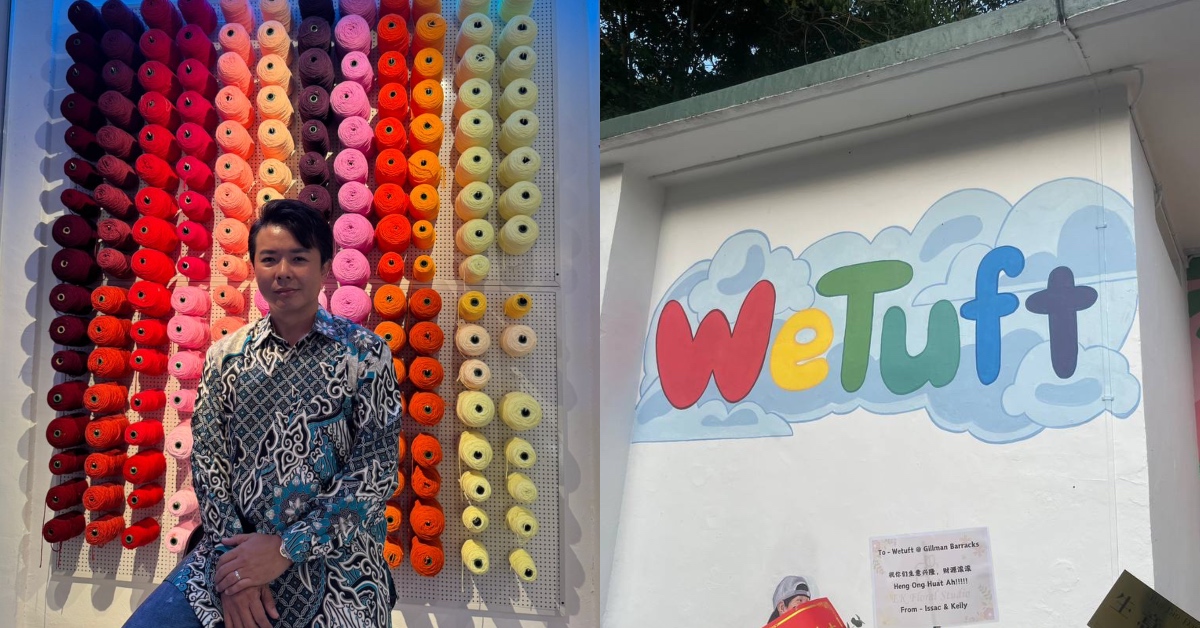Five tufting studios closed. WeTuft bought their yarn and kept going.
Once a popular activity among hobbyists, creatives and even everyday Singaporeans, tufting has seen its initial hype taper off in drastic fashion. The craft—which involves creating plush rugs with handheld tufting guns—took off internationally around 2018, largely thanks to...

Once a popular activity among hobbyists, creatives and even everyday Singaporeans, tufting has seen its initial hype taper off in drastic fashion.
The craft—which involves creating plush rugs with handheld tufting guns—took off internationally around 2018, largely thanks to TikTok, but only landed in Singapore in late 2021. Since then, studios have popped up everywhere, each with full bookings and influencers flocking to try their hand at tufting.
However, the trend proved short-lived. A quick online search now reveals that many of these studios have closed, leaving just a few key players, including WeTuft, still standing.
We spoke to WeTuft founder Edmond Wong, 49, to understand how he navigated the rise and fall of the tufting hype.
“I saw an opportunity”
Edmond studied engineering at polytechnic, but he never followed a traditional career path. Straight out of National Service, he dove into entrepreneurship, starting in 2000 with mobile phone spare parts and accessories during the telecom boom.
He later joined StarHub and expanded its retail chain to eight outlets islandwide. Given his tech and retail background, it might seem a little out of the blue that his next venture would be in the craft world—but he spotted an opportunity in the space.
The idea for WeTuft first came from a young part-timer who worked with Edmond at the time. After researching the market, he noticed most tufting studios in Singapore were “small, hobby-driven setups.”
“I saw an opportunity for a more professional, scalable approach,” Edmond said.
Rather than focusing only on hobbyists or the general public, he recognised that tufting could work well as a team-building and corporate event activity. Especially with the growing emphasis on mental health and wellness, he believed the craft could provide both a therapeutic and creative outlet for teams.
With that goal in mind, he launched WeTuft at Orchard Cineleisure in Jun 2022 alongside a partner (who later returned to his corporate career). It took just three months from conceptualisation to launch.
Rising rentals & waning demand
 WeTuft’s first outlet at Orchard Cineleisure./ Image Credit: WeTuft
WeTuft’s first outlet at Orchard Cineleisure./ Image Credit: WeTuftAt launch, WeTuft saw strong demand, with the studio fully booked daily for its first three months and breaking even in under four.
Since then, Edmond said the consumer peak has passed. Coupled with rising rents, the operating environment has become increasingly challenging for many studios.
WeTuft itself faced similar challenges. Cineleisure only offered a one-year lease, then raised rent by over 100%, prompting Edmond to look for a larger, more sustainable studio.
In Sept 2024, Edmond discovered a space at Gillman Barracks through an SLA tender and won it with a “strong proposal.” He invested around S$50,000 to reinstate the studio, and now pays less than half the previous rent for more than double the space.
 WeTuft’s new outlet at Gillman Barracks./ Image Credit: WeTuft
WeTuft’s new outlet at Gillman Barracks./ Image Credit: WeTuftBut for businesses that didn’t adapt, the rising costs and cooling demand proved fatal. “Many smaller studios have closed—I even bought equipment from five of them,” Edmond shared.
Despite these challenges, WeTuft has remained sustainable, largely thanks to the bulk of its business coming from corporates.
Since launch, over 10,000 customers have tufted their own rugs, and the studio has hosted more than 800 team-building events, ranging from 10 to 100 participants. Some of its clients include major banks, tech firms like Google and Meta, as well as several government agencies, including the Ministry of Education and Singapore Police Force.
The studio also recently hosted three events with over 100 participants each, at a scale that “no one else” in Singapore or Southeast Asia can match, shared Edmond.
Tufting continues to hold global appeal
 Image Credit: WeTuft
Image Credit: WeTuftWhen asked about the outlook for tufting in the coming years, Edmond noted that the craftt continues to hold global appeal. In countries such as Indonesia, China, and across Europe, tufting continues to be practised as a traditional art form.
In Singapore, however, maintaining a foothold in a competitive market requires reinvention. Edmond plans to expand WeTuft into broader art activities, including kids’ classes and SkillsFuture-claimable workshops. He also aims to bring workshops into schools and diversify beyond tufting to offer a wider range of creative experiences.
For those keen on entering the scene, Edmond stressed that the craft must be treated as a business first, not just a hobby. Balancing passion with commercial strategy, along with smart marketing and budgeting, will be key to long-term resilience.
While the craft may see another surge if trends shift—or a celebrity endorsement sparks renewed interest—its real value lies in providing creative, hands-on experiences for corporates, schools, and families. For WeTuft, that focus on sustainable growth and meaningful engagement is what will keep tufting relevant in Singapore.
Find out more about WeTuft here. Read other articles we’ve written on Singaporean businesses here.Also Read: Tuft Club: How TikTok prompted these 3 friends to start up S’pore’s first rug tufting studio
Featured Image Credit: WeTuft/ Vulcan Post

 Koichiko
Koichiko 





























